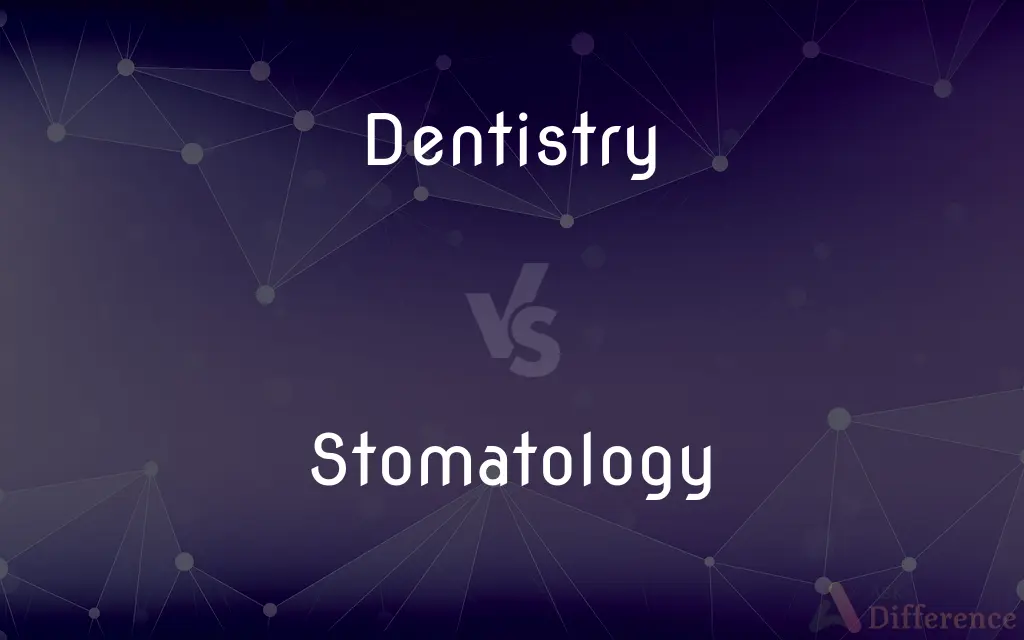Dentistry vs. Stomatology — What's the Difference?
Edited by Tayyaba Rehman — By Maham Liaqat — Updated on March 25, 2024
Dentistry focuses on oral health, including teeth, gums, and mouth care, while Stomatology encompasses a broader study of the mouth and its diseases, integrating more medical aspects.

Difference Between Dentistry and Stomatology
Table of Contents
ADVERTISEMENT
Key Differences
Dentistry is primarily concerned with the diagnosis, prevention, and treatment of diseases and conditions of the oral cavity, particularly the teeth and gums. It includes procedures like fillings, crowns, and root canals, aimed at maintaining oral health and hygiene. On the other hand, Stomatology goes beyond dental issues to include the study and treatment of the entire mouth structure, including the lips, cheeks, and jaws, addressing more complex diseases and conditions that may require medical intervention beyond traditional dental care.
While dentistry often focuses on routine dental care and oral hygiene, emphasizing preventative measures and regular check-ups to maintain teeth health, Stomatology provides a more holistic approach. It deals with the diagnosis and treatment of oral diseases that can affect overall health, such as oral cancer, major infections, and systemic diseases with oral manifestations.
In terms of educational background, dentists typically complete a Doctor of Dental Surgery (DDS) or Doctor of Dental Medicine (DMD) degree, with a focus on clinical practices related to dental health. Whereas, Stomatologists may have a medical degree with specialized training in oral diseases, bridging the gap between dental and medical care, offering a more integrated approach to oral and general health.
The practice of dentistry is widely recognized and understood by the general public, with dentists being the primary care providers for oral health issues. Stomatology, however, is less familiar to many and is sometimes seen as a sub-specialty of dentistry or medicine, depending on the country and its healthcare system, focusing on more severe oral and maxillofacial conditions.
Dentists often work in dental offices and clinics, providing care that includes cosmetic procedures, dental implants, and orthodontics, catering to patients' aesthetic and functional needs. Stomatologists, on the other hand, may work in more specialized settings or hospital departments, dealing with oral diseases that require complex diagnostic and treatment approaches, including surgical interventions.
ADVERTISEMENT
Comparison Chart
Focus
Oral health maintenance and dental procedures.
Study and treatment of the mouth and its diseases.
Scope
Teeth, gums, and preventive care.
Entire mouth, including soft and hard tissues, and their diseases.
Procedures
Fillings, crowns, extractions, and orthodontics.
Oral surgery, treatment of oral diseases, and integration with other medical disciplines.
Educational Background
DDS or DMD with a focus on dental practices.
Medical degree with specialized training in oral health.
Practice Setting
Dental offices and clinics.
Hospitals and specialized clinics, often involving interdisciplinary care.
Compare with Definitions
Dentistry
Emphasizes patient education on oral hygiene.
Good dentistry teaches the importance of daily flossing.
Stomatology
A medical field focusing on the mouth and its disorders.
Stomatology covers both common and rare oral diseases.
Dentistry
The branch of medicine focused on the oral cavity, especially the teeth.
She pursued a career in dentistry to help people achieve healthy smiles.
Stomatology
Includes the treatment of oral mucosal diseases.
Stomatology offers specialized care for autoimmune diseases affecting the mouth.
Dentistry
Can specialize in areas like orthodontics or periodontics.
After dental school, he specialized in orthodontics.
Stomatology
May require collaboration with oncologists for oral cancers.
Stomatology plays a critical role in the multidisciplinary approach to oral cancer treatment.
Dentistry
Includes cosmetic procedures to improve appearance.
Cosmetic dentistry can dramatically enhance a person’s smile.
Stomatology
Bridges dentistry and general medicine.
Stomatology requires knowledge of both dental procedures and medical conditions.
Dentistry
Involves preventive and restorative treatments.
Modern dentistry offers many options for restoring damaged teeth.
Stomatology
Often involved in diagnosing systemic diseases through oral symptoms.
In stomatology, oral lesions may indicate systemic health issues.
Dentistry
Dentistry, also known as dental medicine and oral medicine, is a branch of medicine that consists of the study, diagnosis, prevention, and treatment of diseases, disorders, and conditions of the oral cavity, commonly in the dentition but also the oral mucosa, and of adjacent and related structures and tissues, particularly in the maxillofacial (jaw and facial) area. Although primarily associated with teeth among the general public, the field of dentistry or dental medicine is not limited to teeth but includes other aspects of the craniofacial complex including the temporomandibular joint and other supporting, muscular, lymphatic, nervous, vascular, and anatomical structures.
Stomatology
The medical study of the mouth and its diseases.
Dentistry
The science concerned with the diagnosis, prevention, and treatment of diseases of the teeth, gums, and related structures of the mouth and including the repair or replacement of defective teeth.
Stomatology
(medicine) The study of the mouth and its disorders and diseases; increasingly called oral medicine in current usage.
Dentistry
(uncountable) The field of medicine concerned with the study, diagnosis, and treatment of conditions of the teeth and oral cavity.
Stomatology
Scientific study or knowledge of the mouth.
Dentistry
(uncountable) Operations performed on teeth and adjoining areas such as drilling, filling cavities, and placing crowns and bridges.
Dentistry
(countable) A dental surgery, an operation on the teeth.
Dentistry
(countable) A place where dental operations are performed. Not as common as "dentist's office". Compare surgery.
Dentistry
The art or profession of a dentist; dental surgery.
Dentistry
The branch of medicine dealing with the anatomy and development and diseases of the teeth
Common Curiosities
Can a dentist perform the same procedures as a stomatologist?
A dentist focuses on dental care and procedures like fillings and extractions, whereas a stomatologist may perform more complex medical treatments and surgeries related to the mouth.
What is the main difference between dentistry and stomatology?
Dentistry primarily deals with the health of the teeth and gums, while stomatology focuses on the entire mouth, including diagnosis and treatment of its diseases.
Are the treatments offered by dentists and stomatologists different?
Yes, while there is some overlap, stomatologists offer treatments for more complex diseases that may involve the whole mouth and require medical intervention beyond traditional dental care.
What educational path is required to become a stomatologist?
Stomatologists typically have a medical degree with additional specialized training in oral health and diseases, differing from the dental-focused education of dentists.
Is stomatology recognized as a separate specialty everywhere?
Recognition of stomatology as a separate specialty varies by country, with some places considering it a part of medical studies and others a specialized field of dentistry.
Do dentists and stomatologists work together?
Yes, for comprehensive oral care, especially in cases of complex diseases, dentists and stomatologists may collaborate to provide the best treatment options.
How does stomatology integrate with other medical disciplines?
Stomatology integrates with various medical disciplines by diagnosing and treating conditions that affect the mouth and can indicate systemic diseases, requiring a collaborative approach to patient care.
What kind of procedures does a stomatologist perform that a dentist does not?
Stomatologists perform complex medical and surgical procedures related to the mouth, including treatment of severe diseases and conditions that go beyond the scope of traditional dentistry.
Are there any diseases that only a stomatologist can treat?
Stomatologists are specially trained to treat certain complex oral diseases and conditions, such as severe oral mucosal diseases, that general dentists may not be equipped to handle.
Can a dentist treat oral cancer?
Dentists can play a crucial role in the early detection of oral cancer, but treatment often requires a multidisciplinary approach involving stomatologists and oncologists.
Can stomatology help with diagnosing non-oral diseases?
Yes, since some systemic diseases have oral manifestations, stomatology can play a key role in the early diagnosis of such conditions.
Is cosmetic dentistry part of stomatology?
Cosmetic dentistry is generally considered a part of dentistry, focusing on the aesthetic aspects of the teeth and mouth, whereas stomatology is more concerned with medical conditions and diseases.
What role does oral hygiene play in stomatology?
Oral hygiene is fundamental in both dentistry and stomatology, as good oral health can prevent many diseases that stomatologists treat.
Share Your Discovery

Previous Comparison
Course vs. Direction
Next Comparison
Shade vs. ShedAuthor Spotlight
Written by
Maham LiaqatEdited by
Tayyaba RehmanTayyaba Rehman is a distinguished writer, currently serving as a primary contributor to askdifference.com. As a researcher in semantics and etymology, Tayyaba's passion for the complexity of languages and their distinctions has found a perfect home on the platform. Tayyaba delves into the intricacies of language, distinguishing between commonly confused words and phrases, thereby providing clarity for readers worldwide.
















































